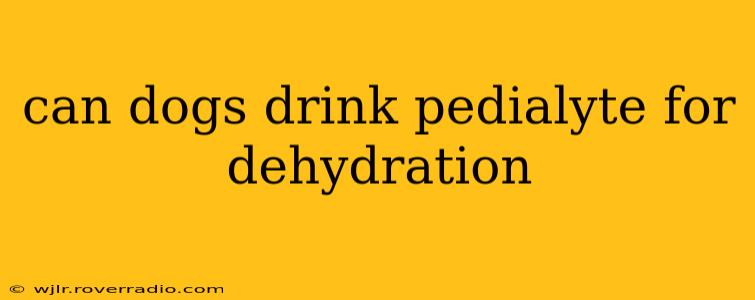Can Dogs Drink Pedialyte for Dehydration? A Vet-Informed Guide
Dehydration in dogs is a serious concern, and knowing how to address it quickly and safely is crucial for every pet owner. While Pedialyte is a popular rehydration solution for humans, its suitability for dogs requires careful consideration. This comprehensive guide explores whether dogs can drink Pedialyte and offers crucial information to help you make informed decisions about your canine companion's health.
Understanding Canine Dehydration
Before diving into the Pedialyte question, let's understand canine dehydration. Dehydration occurs when your dog loses more fluids than it takes in, leading to an imbalance of electrolytes. This can result from various causes, including vomiting, diarrhea, excessive panting, fever, and kidney disease. Symptoms range from lethargy and dry gums to sunken eyes and rapid breathing. If you suspect your dog is dehydrated, seeking immediate veterinary attention is paramount.
Can I give my dog Pedialyte?
The short answer is: Yes, but with caution and under specific circumstances. Pedialyte contains electrolytes crucial for rehydration, but its formulation is designed for human physiology. The concentration of some electrolytes, like potassium, might be too high for dogs, potentially leading to adverse effects. Never give Pedialyte to your dog without first consulting your veterinarian. They can assess your dog's condition and determine if Pedialyte is appropriate, and, if so, the correct dosage.
What are the risks of giving my dog Pedialyte?
While Pedialyte can help rehydrate a mildly dehydrated dog, potential risks exist:
- Electrolyte Imbalance: The concentration of electrolytes in Pedialyte might be unsuitable for dogs, potentially leading to an electrolyte imbalance.
- Artificial Sweeteners: Some Pedialyte formulations contain artificial sweeteners that can be toxic to dogs. Always check the ingredients list.
- Overhydration: Giving too much Pedialyte can lead to overhydration, which is also dangerous.
What are better alternatives to Pedialyte for a dehydrated dog?
Your veterinarian might recommend other rehydration methods, including:
- Plain, Unsweetened Water: For mild dehydration, plain water is often sufficient.
- Homemade Electrolyte Solution: Your vet might guide you on making a balanced electrolyte solution specifically for your dog. Never attempt this without professional guidance.
- Subcutaneous Fluids: In severe cases of dehydration, your vet will likely administer fluids subcutaneously (under the skin) or intravenously. This is the safest and most effective method for severe dehydration.
How can I tell if my dog is dehydrated?
Recognizing the signs of dehydration is crucial for timely intervention. Look for these symptoms:
- Dry gums and nose: Pinch the skin on the back of your dog's neck. If it slowly returns to its normal position, it could be a sign of dehydration.
- Lethargy and weakness: A dehydrated dog may be less active than usual.
- Sunken eyes: Dehydration can cause the eyes to appear sunken.
- Loss of appetite: Dehydration often leads to decreased food intake.
- Rapid breathing: Your dog might breathe faster than usual.
- Vomiting and diarrhea: These can contribute to dehydration.
My dog drank Pedialyte, should I be worried?
If your dog ingested a small amount of Pedialyte without showing any adverse reactions, it's likely not a cause for major concern. However, monitoring your dog closely for any changes in behavior or health is crucial. If you notice any unusual symptoms, contact your veterinarian immediately.
When should I take my dog to the vet for dehydration?
Don't hesitate to contact your vet if your dog exhibits any signs of dehydration. Severe dehydration is a medical emergency. Prompt veterinary care is essential to prevent life-threatening complications.
Conclusion:
While Pedialyte might seem like a readily available solution for a dehydrated dog, it's crucial to remember that it's not a substitute for veterinary care. Always consult your veterinarian before giving your dog any human medication, including Pedialyte. They can properly assess your dog's condition and recommend the most appropriate rehydration strategy, ensuring your furry friend receives the best possible care. Prevention is key; ensure your dog always has access to fresh water, and monitor its water intake, especially during hot weather or after strenuous activity.
